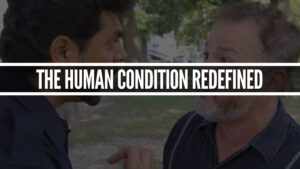Are you in trouble of some kind? Welcome to Life. It’s OK. I’m here to help you. But I may hurt you further if I don’t quantify your situation, and your pain before I take any action. Even my best intentions, absent the below process, could accelerate your “situation” into a disaster.
If a friend reports being in crisis, “Job 1” is to know that the concern is way more than a mere crisis. Either Pride or Shame has kept this person from surfacing. They surface now only because the dam broke; the crisis cannot be managed. Your friend has a survival issue. Don’t underestimate its intensity.
How can you help? Whatever you do, DO NOT impose your will upon someone’s crisis, especially a valued friend. Instead, deploy the following steps to bring meaningful relief, to truly stabilize the situation.
STEP 1: Your friend has needs that cannot be met until fully quantified. No one has the ability to guess, so you must not default to your instincts. Instead, promise your loyalty first. That will summon the most honest description of these invisible concerns. Systematically define them, starting from the ground up. Start with the most immediate dangers.
STEP 2: Ask this question: “What will it take right this minute to stop the bleeding?” Your friend has fallen for reasons that you cannot see. There are probably basic needs, like food, or unpaid bills that risk the loss of power or water. Assess these imediate needs, and solve them. Place your stricken friend fully back on to the ledge from which they’ve fallen.
STEP 3: You’ve placed them back on the ledge. But you’re not done here, not even close. Leaving your friend on that ledge risks them falling back off. Stay close to them. Assume that your friend feels crushing fatigue, caused by a battle that only they know. What will it take to move your friend completely out of danger? Quantify it. You must carry your friend out of the house that’s burning down around them — the one you can’t see, the one your friend is ashamed to fullly describe at this early stage.
STEP 4: With steps 1 through 3 completed, you’ve “secured” the situation, and you have not judged in any way. And oddly, only a single day may have passed. You’ve already done what most people don’t think to do. Namely, immediately stamp out all emergencies. Only now can we pose our next question. How did your friend get to this awful place? Is this a drug or alcohol concern? Has mental illness gone untreated because of shame or stigma? Has a financial crisis crippled your friend? And believe me, they ARE crippled. Relieve the entire burden for a few days. Let your friend get their first good night’s sleep in months.
STEP 5: You’ve rescued this person from all immediate dangers. You’ve assessed the cause of the crisis. Now, what will it take to guide them to sustainability? Illness or Addiction may be the underlying cause. While conducting your investigation, please, let your friend know that you CARE DEEPLY. You’re looking at a silent and intense battle, one that may have raged for months. Your friend is injured, ashamed, and frightened. He feels emotionally exhausted, but your empathy and compassion have come to his rescue, providing a glimmer of strength and courage.
STEP 6: With illness or addiction assessed, with a remedial plan in progress, and with food in their refrigerator, only now can clear and long-term thinking take place. And only a few days have passed since these problems were made known to you! That makes perfect sense, because all explosions are the worst at their beginning.
Expect money to enter the picture again here. If you are disposed to assisting, PLEASE, trust your friend to help himself. Don’t micro-mamage financial needs. This is your friend, not a child. S/he could use some confidence right now. Tell your friend that you believe in them. Do not set terms. THERE ARE NO TERMS AMONG FRIENDS. Set a limit if needed, but keep that to yourself. Your friend will strive to live up to your trust. That’s how you became friends in the first place.
STEP 7: It’s time now to share this crisis with mutual friends, but maintain a disposition of unwavering Empathy. Never devolve into the betrayal of gossip. Identify and gently expel all disinterested parties. Don’t be surprised if the first person you expected to help is also the first person to turn their back. We reveal ourselves in these moments, when decency requires not only our words, but our actions. It’s not for us to judge these individuals. Perhaps their own, unseen hardships have intruded. Their choice of abandonment may one day haunt them. Move on.
Compassionate friends will sincerely wish to help. Encourage them to reach out to your friend, and to be plainly HONEST. Use the same language you’ve always shared. “Look at me, my friend. We’ve laughed so hard and so often, but life has now intruded. Talk to me, and trust me. I want to help.”
When an injured friend feels safe in their Humanity, they will express themselves openly. They will recount the nature — and the trauma — of their experience. Their descriptions are deeply cathartic. They may intensely cry from relief, the sense of hope that YOU gifted to them.
Congratulations. You’re the author of a miracle.
If the above steps were replaced by Judgment, Abandonment, Gossip, Intolerance, Avoidance, and Blame, your injured friend would circle a drain, and perhaps disappear, helped along by our primitive tendency to diminish the weak. We aren’t allowed to fail.
We’re at our best when we’re needed. Lack of compassion deadens the soul. Your words and actions are a great gift, not only to your afflicted friend, but to you as well. “High Tide Raises All Boats.”
Compassion is contagious. It’s little wonder, because Collaboration is in our Biology.
~ Anthony A. Wall, Jr.


















